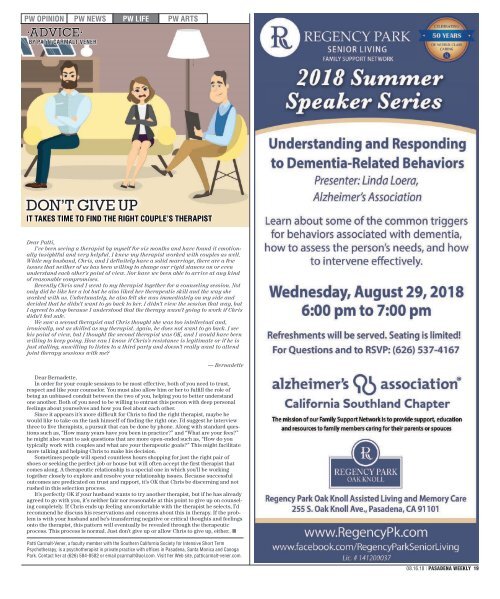08.16.18
You also want an ePaper? Increase the reach of your titles
YUMPU automatically turns print PDFs into web optimized ePapers that Google loves.
PW OPINION PW NEWS PW LIFE PW ARTS<br />
•ADVICE•<br />
BY PATTI CARMALT-VENER<br />
DON’T GIVE UP<br />
IT TAKES TIME TO FIND THE RIGHT COUPLE’S THERAPIST<br />
Dear Patti,<br />
I’ve been seeing a therapist by myself for six months and have found it emotionally<br />
insightful and very helpful. I knew my therapist worked with couples as well.<br />
While my husband, Chris, and I definitely have a solid marriage, there are a few<br />
issues that neither of us has been willing to change our rigid stances on or even<br />
understand each other’s point of view. Nor have we been able to arrive at any kind<br />
of reasonable compromises.<br />
Recently Chris and I went to my therapist together for a counseling session. Not<br />
only did he like her a lot but he also liked her therapeutic skill and the way she<br />
worked with us. Unfortunately, he also felt she was immediately on my side and<br />
decided that he didn’t want to go back to her. I didn’t view the session that way, but<br />
I agreed to stop because I understood that the therapy wasn’t going to work if Chris<br />
didn’t feel safe.<br />
We saw a second therapist and Chris thought she was too intellectual and,<br />
ironically, not as skilled as my therapist. Again, he does not want to go back. I see<br />
his point of view, but I thought the second therapist was OK, and I would have been<br />
willing to keep going. How can I know if Chris’s resistance is legitimate or if he is<br />
just stalling, unwilling to listen to a third party and doesn’t really want to attend<br />
joint therapy sessions with me?<br />
— Bernadette<br />
Dear Bernadette,<br />
In order for your couple sessions to be most effective, both of you need to trust,<br />
respect and like your counselor. You must also allow him or her to fulfill the role of<br />
being an unbiased conduit between the two of you, helping you to better understand<br />
one another. Both of you need to be willing to entrust this person with deep personal<br />
feelings about yourselves and how you feel about each other.<br />
Since it appears it’s more difficult for Chris to find the right therapist, maybe he<br />
would like to take on the task himself of finding the right one. I’d suggest he interview<br />
three to five therapists, a pursuit that can be done by phone. Along with standard questions<br />
such as, “How many years have you been in practice?” and “What are your fees?”<br />
he might also want to ask questions that are more open-ended such as, “How do you<br />
typically work with couples and what are your therapeutic goals?” This might facilitate<br />
more talking and helping Chris to make his decision.<br />
Sometimes people will spend countless hours shopping for just the right pair of<br />
shoes or seeking the perfect job or house but will often accept the first therapist that<br />
comes along. A therapeutic relationship is a special one in which you’ll be working<br />
together closely to explore and resolve your relationship issues. Because successful<br />
outcomes are predicated on trust and rapport, it’s OK that Chris be discerning and not<br />
rushed in this selection process.<br />
It’s perfectly OK if your husband wants to try another therapist, but if he has already<br />
agreed to go with you, it’s neither fair nor reasonable at this point to give up on counseling<br />
completely. If Chris ends up feeling uncomfortable with the therapist he selects, I’d<br />
recommend he discuss his reservations and concerns about this in therapy. If the problem<br />
is with your husband and he’s transferring negative or critical thoughts and feelings<br />
onto the therapist, this pattern will eventually be revealed through the therapeutic<br />
process. This process is normal. Just don’t give up or allow Chris to give up, either.. n<br />
Patti Carmalt-Vener, a faculty member with the Southern California Society for Intensive Short Term<br />
Psychotherapy, is a psychotherapist in private practice with offices in Pasadena, Santa Monica and Canoga<br />
Park. Contact her at (626) 584-8582 or email pcarmalt@aol.com. Visit her Web site, patticarmalt-vener.com.<br />
<strong>08.16.18</strong> | PASADENA WEEKLY 19

















